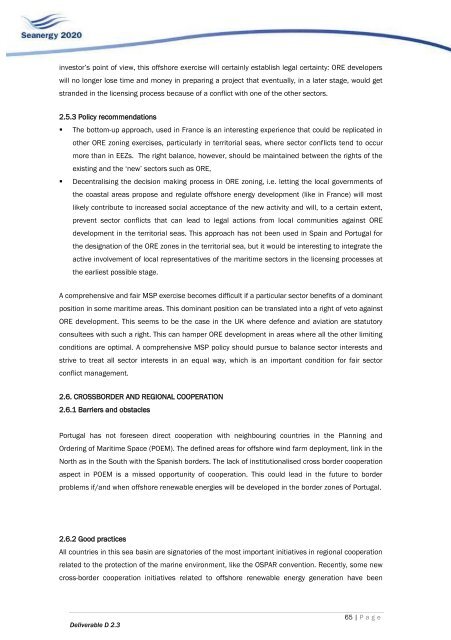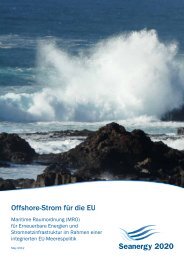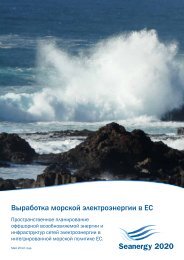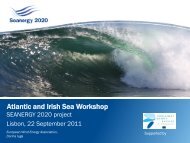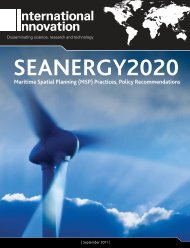Comparative analysis of Maritime Spatial Planning ... - Seanergy 2020
Comparative analysis of Maritime Spatial Planning ... - Seanergy 2020
Comparative analysis of Maritime Spatial Planning ... - Seanergy 2020
Create successful ePaper yourself
Turn your PDF publications into a flip-book with our unique Google optimized e-Paper software.
investor‟s point <strong>of</strong> view, this <strong>of</strong>fshore exercise will certainly establish legal certainty: ORE developerswill no longer lose time and money in preparing a project that eventually, in a later stage, would getstranded in the licensing process because <strong>of</strong> a conflict with one <strong>of</strong> the other sectors.2.5.3 Policy recommendations• The bottom-up approach, used in France is an interesting experience that could be replicated inother ORE zoning exercises, particularly in territorial seas, where sector conflicts tend to occurmore than in EEZs. The right balance, however, should be maintained between the rights <strong>of</strong> theexisting and the „new‟ sectors such as ORE,• Decentralising the decision making process in ORE zoning, i.e. letting the local governments <strong>of</strong>the coastal areas propose and regulate <strong>of</strong>fshore energy development (like in France) will mostlikely contribute to increased social acceptance <strong>of</strong> the new activity and will, to a certain extent,prevent sector conflicts that can lead to legal actions from local communities against OREdevelopment in the territorial seas. This approach has not been used in Spain and Portugal forthe designation <strong>of</strong> the ORE zones in the territorial sea, but it would be interesting to integrate theactive involvement <strong>of</strong> local representatives <strong>of</strong> the maritime sectors in the licensing processes atthe earliest possible stage.A comprehensive and fair MSP exercise becomes difficult if a particular sector benefits <strong>of</strong> a dominantposition in some maritime areas. This dominant position can be translated into a right <strong>of</strong> veto againstORE development. This seems to be the case in the UK where defence and aviation are statutoryconsultees with such a right. This can hamper ORE development in areas where all the other limitingconditions are optimal. A comprehensive MSP policy should pursue to balance sector interests andstrive to treat all sector interests in an equal way, which is an important condition for fair sectorconflict management.2.6. CROSSBORDER AND REGIONAL COOPERATION2.6.1 Barriers and obstaclesPortugal has not foreseen direct cooperation with neighbouring countries in the <strong>Planning</strong> andOrdering <strong>of</strong> <strong>Maritime</strong> Space (POEM). The defined areas for <strong>of</strong>fshore wind farm deployment, link in theNorth as in the South with the Spanish borders. The lack <strong>of</strong> institutionalised cross border cooperationaspect in POEM is a missed opportunity <strong>of</strong> cooperation. This could lead in the future to borderproblems if/and when <strong>of</strong>fshore renewable energies will be developed in the border zones <strong>of</strong> Portugal.2.6.2 Good practicesAll countries in this sea basin are signatories <strong>of</strong> the most important initiatives in regional cooperationrelated to the protection <strong>of</strong> the marine environment, like the OSPAR convention. Recently, some newcross-border cooperation initiatives related to <strong>of</strong>fshore renewable energy generation have beenDeliverable D 2.365 | P a g e


